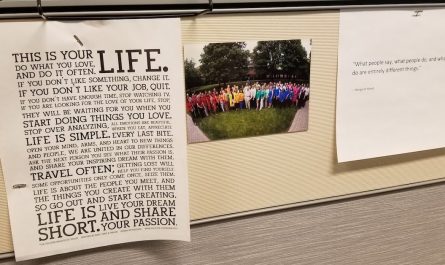We’re always looking for new ways to achieve more of our financial goals in our household. And we will not pass up any technique that can get us to financial freedom faster without at least exploring it. This is how we discovered the next technique.
An implementation intention is an interesting, simple, yet underutilized technique that can help you improve your self-control and, as a result, increase your chances of meeting your financial goals.
I know it’s a fancy term, but bear with me because I’ll define it shortly.
You’re probably aware that the simple formula for financial freedom is to spend less than you earn and invest the difference. We all have good intentions to achieve our financial goals, but we frequently fail to follow through. This technique provides a practical solution to this problem.
The issue is that people succumb to the temptation to spend the majority of their earnings. We pay off debt and then charge more on our credit cards than we should, resulting in a debt hangover by January. We hardly save anything, and as a result, we live paycheck to paycheck. Our money hasn’t even arrived in our bank accounts yet, and there are advertisements everywhere vying for a piece of the action, aka our dollars.
It is critical to replace bad spending habits and find ways to train your mind to deal with salespeople competing for your hard-earned money. If you train your mind properly, those dollars can be invested instead or used to pay off any outstanding debt.
You can train your mind to deal with situations that may put you at risk of spending money you don’t have or should be investing by having implementation intentions.
To make our point, we’ll get a little geeky and look at how your willpower relates to implementation intention and, ultimately, wealth. For the time being, let’s get some definitions out of the way so we can get to the meat of this post.
Implementation intention
An implementation intention is a self-regulatory strategy in the form of an “if-then plan” that can lead to better goal attainment, as well as help in habit and behavior modification.
Wikipedia
The concept of implementation intentions was introduced in 1999 by psychologist Peter Gollwitzer. Studies conducted in 1997 and earlier showed that the use of implementation intentions can result in a higher probability of successful goal attainment, by predetermining a specific and desired goal-directed behavior in response to a particular future event or cue.
Wikipedia
Willpower
The American Psychological Association has a good definition of willpower, so let’s use it for the purposes of this article.
Willpower can be defined as:
- The ability to delay gratification, resisting short-term temptations in order to meet long-term goals.
- The capacity to override an unwanted thought, feeling, or impulse.
- The ability to employ a “cool” cognitive system of behavior rather than a “hot” emotional system.
- Conscious, effortful regulation of the self by the self.
- A limited resource capable of being depleted.
Every day, you have a certain amount of willpower at your disposal. Willpower is like a muscle that gets tired throughout the day and must be replenished.
You won’t have to worry about making decisions when your willpower is at its lowest point of the day if you have an implementation intention. It’s about having a plan in place without having to rely on willpower to make decisions.
“OK, that sounds great, José, but how does this relate to wealth and financial success?”
When your willpower is at its lowest, you run the risk of making the worst financial decisions.
How many of you overspend during the holidays?
Or have you ever had too many margaritas at a happy hour and felt bad about the charges that appeared on your credit card the next day?
Or did you go to a dealer and drive away with a car that would deplete your savings and keep you in debt?
These are all decisions that could have resulted in a better outcome if you had an implementation intention, potentially saving you thousands of dollars.
Bad money decisions and willpower
When our willpower is low, we can all make poor financial decisions. Sometimes we go out for a drink after work because we feel we deserve it after a long and stressful day.
As you may have read in a previous post, we had a Month of Change in August, which included goals like not drinking during the month.
We chose a detox period of 31 days without drinking. On the 31st day of our challenge, our employer hosted a diversity event, which included Asian hors d’oeuvres (a word I never spell correctly without looking it up first) and, guess what else? Free beverages!
The Asian hors d’oeuvres were delicious, and the drinks included Blue Moons and red wine, both of which we enjoy.
Free alcohol and food!!! What should I do?
We were nearing the end of our detox month, and if we wanted to have a drink the next day, we’d have to buy it. Free today, pay tomorrow? The fact that there were free drinks added to the tension!
Tatiana was supposed to attend the event, but she was delayed by a meeting. Everything fell apart after I started typing the following text:

We succeeded in not buying any alcohol during the month, but our willpower fell short. Worse, we failed because we lacked an “if and then” strategy.
What else could have contributed to this poor decision, aside from the free drinks and the fact that we were craving a nice summer drink?
We were exhausted after a long day at work, and alcohol seemed like a welcome distraction. It’s no coincidence that happy hour is immediately following work. When you’re tired of making decisions and are more willing to give in to your desires, they tap into your conscience.
Even judges make bad decisions when willpower is low
According to a study published by the National Academy of Sciences, even judges make poor decisions when their willpower is low. It turned out that the time of day had an effect on their final rulings.
The study found that the most favorable rulings were made at the start of the day and after a lunch break. Favorable rulings would fade as the mornings and afternoons passed. So now you know when to go to court! 🙂
Willpower, strength, and poverty are all related
In another study, Dean Spears, a doctoral candidate at Princeton University, observed a cross-section of American shoppers. Everyone who shops, whether rich or poor, makes economic decisions.
Richer shoppers’ financial decisions are quick and simple. Consider this. You don’t have to give up one thing for the other if your bank accounts are loaded. The same financial decisions for financially insecure shoppers represent a series of difficult tests of self-control.
“I need to buy school clothes for my kids, but I also need that money for groceries, and my gas bill is quite high this month. How am I going to do this?” That is what a shopper with limited financial resources may be thinking.
Spears reasoned that poorer shoppers’ willpower was depleted more because they were faced with difficult financial decisions.
What were they more likely to do at the mall?
They were more likely to eat and drink while shopping than wealthier shoppers. The fact that they were faced with major financial decisions depleted their reserves of self-control.
Using willpower to resist one thing may also deplete your self-control in subsequent situations.
And here we are, in the FI community, quick to judge people for making poor financial decisions without considering the psychology behind their actions.
How to keep willpower replenished
The good news is that you can replenish your willpower and use it more effectively throughout the day by doing the following:
- Reduce the number of decisions you make throughout the day. It’s no surprise that successful people, such as Mark Zuckelberg, dress similarly at most public events. He has several identical gray T-shirts that he wears to simplify his life and make as few decisions about how to dress for the day as possible.
- Make important decisions first thing in the morning.
- Plan your day the night before.
- If you need to make decisions later in the day, take a break and eat something.
- Remove the choice between spending and saving.
- Sip some lemonade. Yes, lemonade. Give your brain some sugar because it is a high-energy organ that relies on a steady supply of glucose (blood sugar). If you want to avoid refined sugar, you can eat fruits.
- Be yourself. It takes a lot of effort to suppress your natural personality.
- Practice delayed gratification. As Silvia Barcellos points out in the TED Talk video below, simply knowing about this concept increases your chances of success.
9. Get some exercise.
10. Watch a funny video. A good mood can help you maintain your willpower.
How to use implementation intentions to help you achieve your financial goals
So far, we’ve learned that willpower can be replenished and that implementation intentions can lead to improved goal achievement, but how can the technique help us achieve our financial goals?
The “if-then” plan is a more specific approach than simply having a goal. As an example: “I want to save more money this year,” could be a goal. However, by being more specific and employing a “if-then” strategy, you can increase your chances of success. Instead, you could say, “If I get a bonus or windfall, I’m going to put 90% of it into X,Y, and Z accounts.”
Other examples of how you can implement these to help you reach your financial goals:
- If I go out to eat, I’ll order water instead of alcohol. Assume you go out to dinner with some friends. While your friends peruse the menu, unsure of what to order, you have already made your choice! And congratulations, you’ve just cut your dining out costs.
- If I go shopping, I’ll make a list of what I need and only buy what’s on that list.
- If I make more money than I need, I’ll pay off the debt with the highest interest rate first.
- If I’m going to buy a house, I’m going to base my decision on a set of strict criteria.
- If I feel like I need more clothes, I’ll go through my closet first before going shopping.
- If I get a raise, it will automatically go into savings.
You can help yourself achieve financial success by setting your implementation intentions.
Final thoughts
I only recently discovered this technique, but I realized that we’ve been using it throughout our financial journey. When we receive bonuses or make money that exceeds our budget, there is no doubt about where the money is going. It will be used to purchase our financial freedom. We’ve been doing it consistently for the past few years, and we’re only a month or two away from financial independence.
Compounding is now working harder than ever to get us to our goal and beyond.
We had a budget that we stuck to when planning our wedding. We also kept the process stress-free, which helped us maintain our willpower. As a result, we avoided having to make difficult decisions when we could have been exhausted, and we ended up breaking even after accounting for the gifts.
Write your plan on paper or on a computer and let us know how it goes. Share this information with others as well, because studies have shown that knowing this information makes people more likely to achieve their financial goals simply by being exposed to it.
This technique is effective! So give it a shot.






Nice job! Overall, even though YOUR didn’t meet your stretch goals, you made tremendous progress! Life has a tendency to sometimes get in the way of accomplishing some of our goals, but it sounds like you regrouped and still came out ahead.
Thanks! Yes, life sometimes can definitely get in the way of things. You just hope to at least learn from the experiences and keep moving. Thanks for commenting.
Thank you for sharing so much!
Great article. I try to reduce my temptations to spend in the food dept by having plans as well. I have a staple of snacks near my desk, which usually involve fruit, nuts, or a cup of tea. I also bought a single serve coffee maker (not Keurig, just a regular coffee grounds machine) for work that has saved me hundreds over the past 2 years.
Thank you. Having snacks around is definitely a great way to save at work. Those vending machines are budget killers and a lot of time don’t have the healthiest choices. Awesome ways to save there. Thanks for stopping by.